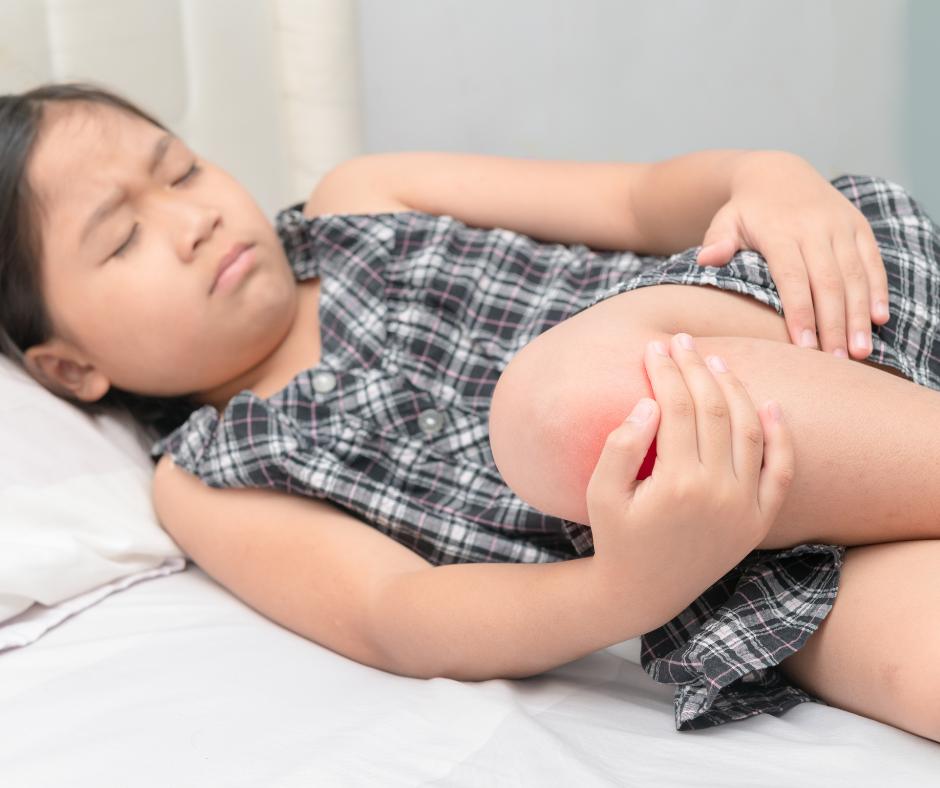Growing Pains In The Knees (Osgood Schlatter's Apophysitis)
What is Osgood Schlatter's Apophysitis?
Osgood-Schlatter Apophysitis is a condition that affects the area just below the kneecap, where the patellar tendon attaches to the shinbone (tibia). It occurs when the growth plate in this area becomes irritated and inflamed, leading to swelling, tenderness, and sometimes the development of a bony bump. This condition is most common in children and adolescents who are still growing.

Table of Contents
What Causes Osgood Schlatter's Apophysitis?
Osgood-Schlatter Apophysitis is caused by repetitive stress and strain on the growth plate located at the top of the shinbone (tibia), just below the knee. During activities like running, jumping, or kneeling, the quadriceps muscle pulls on the patellar tendon, which then tugs on the growth plate. In children and adolescents, these growth plates are softer and more vulnerable to irritation than fully developed bone.
Common contributing factors include:
- Sports or physical activities that involve repetitive jumping, sprinting, or kneeling, such as basketball, soccer, or gymnastics.
- Rapid growth spurts, which can increase tension in the muscles and tendons.
- Tight quadriceps or hamstring muscles, which add extra strain on the knee and shin area.
These factors can cause inflammation, pain, and the characteristic bump at the site of the growth plate.
Symptoms of Osgood Schlatter's Apophysitis
Osgood-Schlatter disease causes pain just below the knee, where the patellar tendon attaches to the shinbone. There may be a bump or swelling in this area, and it’s often tender to touch. The pain gets worse with activities like running, jumping, or squatting.
The knee can also feel stiff, and the muscles around it, especially the quadriceps, may become tight. While pain is more intense during activity, it tends to improve with rest. Symptoms can vary, with some people feeling only mild discomfort, while others experience more severe pain that limits movement.
Visit Us Today
Hope Island
Phone: 07 5510 9222
Located within Hope Island Marketplace Medical & Skin Clinic, 99-103 Broadwater Ave Hope Island QLD 4212
Jimboomba
Phone: 07 5546 9766
Located Within Jimboomba Medical Centre, Unit 1/69 Cerina Cct, Jimboomba QLD 4280
Beenleigh
Phone: 07 3287 2224
Located Within Beenleigh Mall Medical Centre, Shop24A, 40/68 Main Street, Beenleigh QLD 4207
Eagleby
Phone: 07 2889 1666
Located Within Eagleby Family Practice, 5/120 River Hills Rd, Eagleby QLD 4207
Harristown
Phone: 07 4635 6111
Located Within Toowoomba Medical Centre, 146 Drayton Road, Harristown QLD 4350
Marsden
Phone: 07 3067 2370
Located Within Marsden Family Doctors, Shop 28/55-77 Chambers Flat Rd, Marsden QLD 4132
Keperra
Phone: 07 3355 4082
Located Within Keperra Medical Clinic, 14 Dallas Parade Keperra QLD 4054
Coomera
Phone: 07 5573 5663
Located Within Doctors @ Coomera Central, Shop 6, 21 Coomera Grand Drive, Upper Coomera, QLD 4209
Newtown
Phone: 07 4633 8700
Located Within Ochre Medical Centre Wyalla, Shop 20, 238 Taylor Street, Newtown QLD 4350
What Can Be Done To Treat Symptoms?
- Strengthening and stretching exercises for surrounding muscles
- Footwear assessments to ensure shoes provide proper alignment and support
- Footwear modifications to improve comfort and reduce strain
- Guidance on warm-up and cool-down techniques to prevent further strain
- Custom orthotics to address any alignment issues that may be contributing to knee pain
This approach is designed to manage symptoms and improve overall mobility while minimising future discomfort.
Enquire Now
Osgood Schlatter's Apophysitis Affecting Your Child?
Not The Condition You Are Looking For?
Find out more about the conditions we treat by clicking below.
